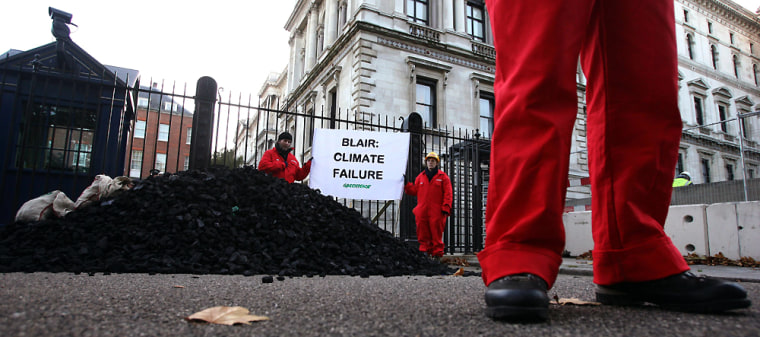British Prime Minister Tony Blair, who has made global warming one of the key themes of Britain’s presidency of the Group of 8 industrial nations, was accused by environmental activists on Monday of failing to tackle the issue, despite many pledges of tough action.
As Greenpeace dumped five tons of coal outside the prime minister’s London residence in protest at what they said was his backsliding, the World Wide Fund for Nature accused him of saying one thing but doing the opposite on implementing the Kyoto climate change accord..
“Blair has gone from being the great hope to being the great threat,” Greenpeace spokesman Ben Stewart said. “His rowing back on Kyoto is deeply, deeply worrying.”
WWF’s chapter in Britain said that far from leading by example, Blair’s rhetoric had proved to be hollow.
“The prime minister came into office with many opportunities to show environmental leadership, but despite all of his passionate speeches ... when the chips are down he has often jumped the wrong way,” WWF-UK director Andrew Lee said.
Government response
But Blair’s office rejected the accusations.
“We remain committed to our tough CO2 (carbon dioxide) target ... and we are one of the few countries on target to meet our Kyoto targets,” Blair’s spokesman said.
“But the reality we all face is that Kyoto did not include the U.S., India or China. That is why it is so vital to start getting a consensus on what happens post-Kyoto,” he added.
The criticisms come two weeks before a key meeting in Canada to try to map out a course of action after the first phase of the Kyoto climate change protocol ends in 2012.
The burning of fossil fuels like coal is seen by many scientists as a reason for higher global temperatures. Those fuels release CO2, a key gas that traps heat like a greenhouse.
Top scientist’s climate warning
They followed a warning last week by Lord May, president of the Royal Society, the national science academy, that Britain was losing its moral authority on climate change because it was missing its own goals on cutting greenhouse gas emissions.
Signatories to Kyoto, which came into force in February after Russia ratified it, have vowed to cut global greenhouse gas emissions by five percent below 1990 levels by 2010 --although every country has its own specific target within that figure.
The United States, the world’s biggest emitter of CO2, has refused to sign up on the grounds that the economic consequences of doing so would be catastrophic.
A report last week by a European think-tank, the International Council for Capital Formation, said hitting the Kyoto targets could wipe out at least 200,000 jobs each in Italy, Germany and Britain and more than 600,000 in Spain.
Blair persuaded his fellow Group of 8 leaders at a July summit to agree to some actions on global warming but with no targets or timetables.
Britain has vowed to cut its greenhouse gas emissions by 20 percent below 1990 by 2010, but environmentalists have said it is way off target.
